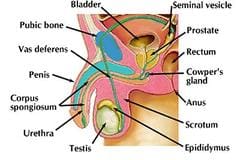10 THINGS YOU DIDN’T KNOW ABOUT THE PROSTATE
10 THINGS YOU DIDN’T KNOW ABOUT THE PROSTATE
10 THINGS YOU DIDN’T KNOW ABOUT THE PROSTATE
Prostate play is getting a lot of attention (as are, hopefully, the prostates themselves), but they’re still hidden away when it comes to our sexual education. Let’s face it – prostates are tucked away inside the body, hard to figure out for those of us that want to play with them, and unfortunately still part of the shame-based response to anal play for men. So, to keep you all well-versed on P-spots, I offer these ten facts…

- Prostates are the reason that semen is milky white. The fluid that is secreted by the prostate makes up about 30% of the entire ejaculate and is white in color. It also helps makes the ejaculatory fluid more alkaline, to combat the acidity of vaginal fluid and help the sperm make it to their final objective – the egg.
- The word “Prostate” comes from the Greek word prostates, which means “to protect or stand guard over”. What’s it protecting? The bladder, perhaps, as it’s at the base of the bladder where the urethra begins.
- Benign Prostatic Hyperplasia, or BPH for short, is a disease of the prostate that affects older men. In it, the prostate swells and narrows the outlet to the urethra from the bladder, causing an increase in the frequency of urination. There is some evidence that suggests that regular orgasms (including masturbatory ejaculation) may help prevent BPH. Just one more reason for you to stay at home, surfing the ‘net!
- Some men orgasm solely from prostate stimulation. In fact, some men say that they’d prefer to NOT have any penile stimulation when they’re enjoying their prostates…it can distract them from the experience of pleasure by changing the focus to a different part of the anatomy.
- The prostate is not the size of a walnut. It’s actually the size of a lemon! We often think of it as just on the dorsal (back-wards) side of the body, but actually, it fully surrounds the urethra at the base of the bladder.
- Prostate cancer can be a scary diagnosis to hear – however, we’re lucky that there are blood tests that your doctor can perform during your annual checkups to help diagnose (and treat!) prostate cancers earlier than ever. And with prostate cancer, early detection and treatment make a tremendous difference in the quality of life (and quality of sex life) after diagnosis!
- Prostate play shouldn’t actually hurt – if it does, crank back on the pressure and see how it feels. If it’s still painful, it’s time to go to the doctor – it may be a sign of Prostatitis, an inflammation of the prostate itself which is almost always easily treatable by medication. If you end up with a diagnosis of Acute Prostatitis, it’s also important to avoid pressure on the prostate until it’s completely treated, to keep the inflammation from spreading outside of the prostate itself.
- There really is a Female Prostate – it’s the Skene’s Gland, which is located in the region of the G-Spot and may have as much to do with female ejaculation as the male prostate has to do with male ejaculation! And the similarities don’t end there – many men share experiences of pleasure during prostate stimulation that are similar to what women report during G-spot stimulation.
- Prostate and G-spot sex toys can often be interchanged – the “come here” curve of a finger probing for both is the same, and as long as the girth of the toy can be accommodated and it’s appropriate for anal use, don’t let the label distract you from enjoying it!
- The trick to using a prostate massager, like the Aneros, is to insert it with plenty of lube and use your PC muscles to “rock” it while you’re wearing it. Slip it in, sit back, and squeeze & release your pelvic muscles in all sorts of ways to find out what works best for you. You’ll have a shooting good time – I promise!
With Pleasure,
